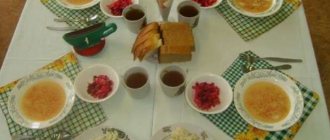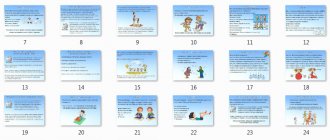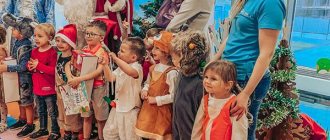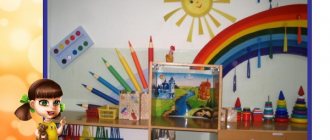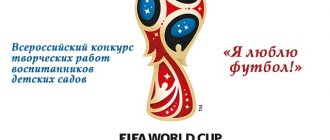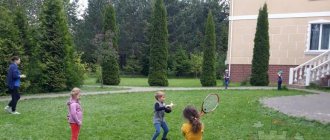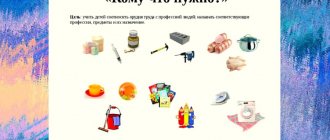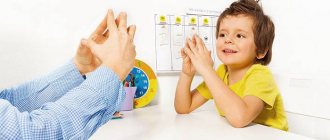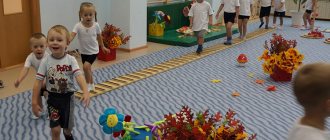Memo for teachers “Organizing the morning reception of children in kindergarten” article
Organization and holding of the morning reception
A thoughtful and well-organized morning reception for children is of great importance in the daily routine. Morning reception in kindergarten largely depends on how adults and children greeted the child. The teacher’s friendly intonation and good mood are conveyed to the children: “Hello, we are glad to see you. Goodbye, we are waiting for you again tomorrow. We will be glad to see you." If the child was greeted with kind words and kindness, then the child will have a good mood for his further stay in kindergarten.
During the morning reception, problems in all educational areas are solved.
The main task of teaching work in the morning is to include children in the general routine of kindergarten life.
Morning reception is reflected in the teachers’ calendar plan and corresponds to the calendar and thematic planning of the “Preschool Educational Program”.
You can welcome children both outdoors and indoors. In the summer, the teacher conducts morning receptions in the fresh air.
Reception of children usually starts from 7-30 o'clock and lasts until 8 - 20 o'clock. To prepare for receiving children, the teacher must come to the kindergarten in advance and ventilate the room. Prepare material for children’s joint and independent activities with the teacher - didactic games, paintings, various attributes for role-playing and outdoor games, visual aids, musical compositions, etc. The teacher prepares games and toys, arranging them in such a way that it is convenient for children to take them and play without interfering with each other.
The first thing the teacher should pay attention to during the morning reception is the state of the child’s health. If the teacher is attentive and knows well the individual characteristics of children, he can determine by appearance whether the child is healthy. As a rule, healthy children, when they come to kindergarten, begin to play, willingly communicate with each other, and move a lot. If the teacher suspects that the child is not healthy, he talks with the parents, finds out how the baby slept, whether he complained about anything, and takes his temperature. If a child’s illness is discovered after the parents leave, the teacher isolates him from other children, puts him to bed, informs family members about the incident and invites a medical professional.
A child who has not attended kindergarten for a long time should not be admitted without being examined by a doctor or nurse. If a child has missed kindergarten for more than five days, parents must provide a certificate stating that the child is healthy.
When meeting each child, the teacher talks with him about the weather outside, about the mood with which the preschooler came to kindergarten. You can ask older children: “What amazing thing did you see on the way to kindergarten, who did you meet?” In younger groups, the minute of entry is more theatrical. The child can be greeted by a fairy-tale character along with the teacher. The teacher uses songs, nursery rhymes, and bright toys that help to find contact and extinguish negative emotions. The rhythmic text of poems, nursery rhymes, and jokes encourages children to move, creating a joyful mood.
In the morning, if children come gradually, it is convenient to carry out individual work, which is planned in advance with a specific child or with a small group of children. Conversations may be accompanied by viewing illustrations accessible to children.
In the morning, the most favorable time for organizing heuristic conversations, in which cognitive tasks are solved using reasoning. The teacher must guide the course of reasoning, directing the children’s thoughts in the right direction. For example, discuss why it was slippery to go to kindergarten, remembering the warming in the evening and the morning frost, which is why an icy crust appears.
Also, in the morning, observations of indoor plants in a corner of nature are planned, work is carried out with the nature calendar (children mark the day of the week, day, month, precipitation).
Children work in the morning hours. Daily work (duties) are not planned for every day. However, if a new type of duty is introduced, the duties of the duty officers become more complicated, or conditions change, then it becomes necessary to reflect this in the plan. The teacher organizes work in a corner of nature. Children water the plants, loosen the soil, while the children fix the names of indoor plants, step by step following the rules for caring for them.
In solving problems in the “Artistic Creativity” area, children are asked to make sketches of their mood, draw music or a drawing on a free topic. You can suggest working with plasticine or clay.
The emotional comfort in the group during the day depends on how the morning reception went, how the child entered the group, and how he was greeted. The organization of the morning reception will determine in the future whether the child will be happy to go to kindergarten, willing to join the group, or will look for a reason to stay at home.
"Morning filter" in preschool educational institution
“Morning filter for children in preschool educational institutions”
Resolution of the Chief State Sanitary Doctor of the Russian Federation dated May 15, 2013 N 26 approved the sanitary and epidemiological requirements for the structure, content and organization of the operating mode of preschool educational organizations" (SanPiN 2.4.1.3049-13. Sanitary and epidemiological rules and regulations...")
These rules and regulations are aimed at protecting the health of children when carrying out activities for their upbringing, training, development and health improvement in preschool organizations and establish sanitary and epidemiological requirements for the conditions of placement of preschool institutions, equipment and maintenance of the territory, catering, etc.
The daily morning reception of preschoolers is conducted by teachers who interview parents about the state of health of the children.
According to indications, the nurse examines the pharynx, skin and measures the child’s body temperature. Admission of children to the nursery group is carried out by a person with a medical education. The pharynx and skin are examined daily, and the temperature is measured. Patients and children with suspected illness identified during the morning filter are not admitted to the preschool educational institution; sick people identified during the day are isolated.
Depending on the condition, the child is isolated until the parents arrive or is hospitalized.
Once a week, a health worker examines children for head lice.
The inspection results are recorded in a special journal. If children are found affected by head lice, they are sent home (for treatment).
In order to stop the spread of various diseases during the morning admission of children to a preschool institution, kindergarten workers constantly conduct a thorough morning “filtering” (medical examination). The seasonal rise of various diseases in children occurs very often, there are many reasons for this. In this regard, in all children's institutions this issue has been under constant control for a number of years by the heads of kindergartens, namely, the mandatory and thorough implementation of the so-called “morning filter” by employees.
Before the start of the day, a medical worker or teacher carefully examines each student and always measures his temperature.
“Morning filter” is carried out in the presence of parents (legal representatives). Data about the child’s condition (temperature, condition of the skin, pharynx) are entered into a special notebook, in which parents also sign if they agree with the results of the examination of their children.
To prevent the spread of colds, intestinal and other diseases, our kindergarten constantly ensures that children arrive healthy, and those who show symptoms of illness are sent home.
After suffering from an illness, as well as absence for more than 5 days, children are admitted to a preschool educational institution only if they have a certificate from a local pediatrician indicating the diagnosis and duration of the disease.
Dear parents, we kindly ask you to be understanding about the daily “morning filter” procedure and be sure to be present when the child is examined.
Under no circumstances should you send your child to kindergarten alone!
The life and health of our children are in our hands!
Virus prevention and detection
Hand washing and temperature measurement should become a tradition for children and kindergarten staff. Parents and strangers should not be allowed into the territory.
When entering kindergarten, the child's temperature is taken. Rospotrebnadzor recommends buying a non-contact infrared thermometer. It is not disinfected after each use, so you can use one for everyone. This “morning filter” procedure should not create crowds of people. To do this, you can set different arrival times for each group. We take the temperature for the second time at lunchtime.
In the kindergarten there should be hand sanitizers in visible places - at the entrance, in the bathrooms and in the dining rooms. Teachers ensure that hygiene standards are observed so that children disinfect their hands before eating and between classes. Masks are not required. But it is mandatory to conduct lectures on personal hygiene for children and parents.
Important! If a child has a fever or signs of respiratory tract disease appear, he must be urgently isolated from the general group in a specially prepared room. After this, call your parents or an ambulance.
Consultation for educators
The daily morning reception of children should be carried out by educators who interview parents about the state of health of the children, examine the pharynx, skin, if indicated, measure body temperature. In nursery groups, admission takes place with daily measurement of body temperature. During an influenza epidemic, body temperature is measured in all age groups daily. Children identified during examination with suspected illness are not admitted to kindergarten. Children who become ill during the day are isolated from healthy children in the isolation ward until their parents arrive.
The morning welcome to kindergarten largely depends on how the adults greeted the child, whether they were happy to see him, and how they sent him home in the evening. The friendly intonation and good mood of the teacher and nanny are conveyed to the children: “Hello, we are glad to see you. Goodbye, we are waiting for you again tomorrow. We will be glad to see you." If the child was greeted with kind words and kindness, then the child will have a good mood for his further stay in kindergarten. You need to raise a kind child, and 80% depends on the mood of those around you and the child himself, and 20% on the methods.
The first minute is praise, kind words accompanied by music.
The music is calm, kind, relieving tension - a moment of inspiration. In nursery groups, the minute of entry is more theatrical: a fox, a cockerel, a hare, a bear,... How much fun a bunny, jumping around the room with words, causes in children:
“The little bunny is jumping,
Near the rubble
The bunny jumps quickly
You catch him."
During the adaptation period, the child misses home, is unable to communicate with other children, and is depressed. Songs, nursery rhymes, bright toys help to find contact and extinguish negative emotions. Reading a nursery rhyme encourages children to take action. The rhythmic text of poems, nursery rhymes, and jokes encourages children to move, creating a joyful mood.
If a child is naughty, you need to distract him, find a way to help the child relax, stroke him, set him up for good, and not rush him or shout.
You can ask older children: “What amazing thing did you see on the way to kindergarten, who did you meet?”, or take the same note, repeat his actions, the child needs to see himself, as in a mirror.
To establish emotional contact, a pre-prepared environment for receiving children is more important. Organization of the environment involves creating conditions to protect the nervous system of children from excessive excitement. It is necessary to organize the environment accordingly, select benefits (music, quiet play, fairy tales with good characters, rewards, surprises - toys - bright musical, mechanical, etc.) When the children are all gathered in a group, give the instruction: “Good morning, kids. A new day has come, we smile at each other. We'll have fun today, okay. Forget everything bad, sadness, evil - and exhale warmth, a smile, a kind look. Look at each other, smile. Let's wish each other a good day.
The emotional comfort in the group during the day depends on how the morning reception went, how the child entered the group, how he was greeted, whether they were expected, what mood the adults around him were in, and in the future whether the child will be happy to go to kindergarten, with a desire to come in a group, or will look for a reason to stay at home.
Social distance
Educators need to reduce the number of children in each group. As a result, you will get more groups, but each child will have a personal space of 1 sq. m. meters. The exact number of children in the group depends on the size of the rooms.
If possible, you need to maintain a distance of 1.5 meters between children and teachers. It is recommended to move some classes outside, if the weather permits. This is especially true for sports exercises, modeling and drawing.
Important! Each group should study in the same room. Movement around the garden should be minimized. Before a new group arrives in the office, they do a superficial cleaning.
Premises treatment
Every morning begins with intensive cleaning of the premises with disinfectants. Processing is carried out before the children arrive. And once a week you need to do general cleaning. During the day, it is important to adhere to the following rules:
- ventilate rooms with through air every 2 hours. There should be no children there at this time;
- during breaks, disinfect surfaces - toys, tables and other furniture;
- use devices for air disinfection;
- Kitchen workers must wear gloves and disinfect utensils and tables after each use.
Important! Disinfectants must be chlorine-free. A five-day supply of treatment products should be kept in the kindergarten.
In the process of organizing routine moments in the preschool educational institution
Guidelines
Features of organizing a morning reception
The organization of a morning reception should first of all be aimed at ensuring the child’s gradual entry into the life of the kindergarten, creating a calm psychological comfortable mood in children.
A thoughtful and well-organized morning reception for children is of great importance in the daily routine. A friendly meeting from their teacher affects their mood: children should feel that they are expected, that they will be welcome, and then they will go to kindergarten with great desire
The teacher sees in what mood the child came to kindergarten and shows pedagogical tact: either he immediately involves the child in activities, or gives him the opportunity to be alone and calm down.
Reception of children can take place both outdoors and indoors. In good weather, it is advisable to receive children in the fresh air at any time of the year.
The teacher thinks in advance about the organization of children’s activities during the period from reception to preparation for breakfast. Having finished receiving children, the teacher invites the children to morning exercises. After the gymnastics, preparations for breakfast begin.
In the conditions of a morning reception, the teacher solves educational problems taking into account the principle of integration of educational areas.
| Educational area (FSES): | Legend (FGT): |
| 1. Physical development | F – physical culture; Z – health |
| 2. Social and communicative development | B – safety; S – socialization; T – labor |
| 3. Cognitive development | P – cognition; H – reading fiction |
| 4. Artistic and aesthetic development | H-T – artistic creativity; M – music. |
| 5. Speech development | K – communication |
Implementation of the principle of integration of educational areas in the process of organizing morning reception
Senior preschool age
| Structural components of the regime moment | Main directions | Tasks | Forms, methods, techniques |
| Meeting of children with teacher | Formation of prerequisites for constructive, mutually pleasant cooperation for the coming day. Accompanying children in situations of arbitrary switching from one social environment (family education) to another (public education). Development of the foundations of a culture of safe living in public places | To form habits of following the rules of etiquette in a meeting situation, to develop the skills of demonstrating one’s disposition and readiness to cooperate (verbal and non-verbal means) in relation to all participants in the educational process (S, K, H-T). To develop in children the strong-willed skills (efforts) to abstract themselves from the unpleasant moment of parting with their parents without compromising the psychophysiological well-being of both the children themselves and the parents, with the desire to join the life of the group (mom (father) goes to work - I go to kindergarten - this is mine favorite “work”) (S, P, Z, K). Develop the skill of choosing and following a safe route to an educational institution: repetition, pronouncing the rules of safe life (traffic rules, rules of behavior with strangers, rules of behavior in public transport) (B, P, C). | Welcome dialogue. Personal example. Situational conversation. Artistic word. Questions of a problematic nature: What dangers does the road contain? What can be done to avoid them? Did you follow all these rules? What is your attitude towards people who do not follow traffic rules? Do you have a desire to help, suggest, correct? |
| Inspection, survey, “filter” | Developing the habit of being careful and attentive to your health and the health of those around you. Formation of the foundations of valeological culture and healthy lifestyle habits (HLS) | To form children’s ideas about the physiological and functional characteristics of the human body (P, Z, B, F). Develop sustainable habits: - mandatory home “filter”, “listening to your health” before coming to a public institution (in order to preserve both your own health and the health of those around you); - be clean, neatly dressed, with trimmed nails, well-groomed hair (girls have braids, boys have haircuts) (F, Z, B, S, K, P, H-T). | Questioning, inspection, test, recording the result, praise, symbolic encouragement |
| Interaction with parents | Search, solution, discussion of current topics, issues, areas of interaction between parents and teachers, as equal partners in the educational process | In the implementation of this structural component, the child can observe and “try on” the model of interaction between the adults closest to him - parents and teacher (S, K, P). | Conversation, consultation, visual campaigning, launching questionnaires, surveys |
| Changing clothes | Development of independence when performing dressing-undressing operations | Develop the ability to dress and undress independently in a certain sequence; do not confuse your things with the things of other children; carefully put them in a cabinet (P, X-T, B); Follow the rules of safe behavior in the reception room (B, P, S, H); Develop the ability to offer and provide assistance to comrades, and, if necessary, seek help from adults and peers (K, S). | Reminder, Positive Evaluation, Request, Encouragement |
| Hygiene procedures (after street) | Formation of a sustainable habit of observing personal hygiene rules | Develop the ability to independently perform actions provided for by the rules of personal hygiene: · visit the toilet; · wash your hands after going outside, after using the toilet; · pay attention to your appearance, put it in order. Form and develop the skill and desire to comply with the rules of safe behavior in the toilet room (move calmly, close the taps, report malfunctions, etc.) (Z, P, B, S, K, H-T, T). | Reminder, positive evaluation, encouragement |
| Independent activities based on interests. Duty in the corner of nature and group premises | Development of self-organization skills, active exploration of developing space | Form an active position: in independently choosing a development center; in planning one’s activities depending on its fullness, or maybe in spite of it (fantasy) (P, S, K, H-T). To develop in children a sense of responsibility for the assigned task (the well-being of plants and inhabitants of a living area, the comfort of comrades). Develop the ability to independently regulate compliance with the rules of the game; children taking on roles; using substitute objects; expansion of storylines (P, K, H-T, S). | Encouragement, positive assessment Creation of problematic situations |
| Discussing the current day's plan with children | Development of one’s own, internal cognitive motivation | To develop the ability to take into account the wishes of partners for interaction in organizing activities, distribution in development centers, and choosing partners (S, K, H-T); Develop the ability to express and realize your desires and needs (Z, K, S, P). | Dispute, situational conversation, creating a problematic situation, praise |
| Individual work | Individual work with a specific child (subgroup of children) on a specific problem. | Didactic games and exercises |
Implementation of the principle of integration of educational areas in the process of organizing charging
| Structural components of the regime moment | Main directions | Tasks | Forms, methods, techniques |
| Preparing to charge | Formation of the foundations of valeological culture | · Form and develop the need to satisfy physical activity through systematic exercise (a systemic habit for life). · Develop knowledge about sportswear, shoes and equipment, their feasibility and the dangers hidden in their non-use or improper use (flat feet, falls, injuries). Sportswear, shoes - fit tightly to the body (leg) without interfering with movement, and must be the right size. (Z, F, B, P) | Situational conversation, Instruction, Help, sample demonstration |
| Charger | Development of motor activity | · Develop the ability to correctly and clearly perform exercises according to the model and verbal instructions. · Develop the skill: self-assessment of the load received, based on the accumulation of muscle fatigue; self-regulation of speed (frequency of movements) depending on felt fatigue. · Develop feelings of satisfaction, pride, joy from the beauty of the exercises performed, both by the child himself and in interaction with peers. · Develop the ability to operate with sports equipment. (Z, B, H-T, F). | Exercises, Speaking, Approval. Praise, Encouragement |
| Completing charging | Developing a sense of satisfaction from physical activity, increasing muscle tone - the basis for the formation of a harmoniously developed body. | · Develop the need for the logical completion of physical activity with water procedures (washing, wiping). · Develop independence in cleaning uniforms, sports equipment, changing into “house” clothes and shoes. | Relaxation, Conversation |
Organization of articulatory gymnastics taking into account the principle of integration of educational areas
| Structural components of the regime moment | Main directions | Tasks | Forms, methods, techniques |
| Preparation for articulation gymnastics | Formation of a culture of activity and behavior (Z, B, P, S) | · Develop ideas about the benefits of articulatory gymnastics · Form and develop the skill and desire to follow the rules of safe behavior: handle the mirror carefully, because it can be dropped, broken, or cut. · Develop the ability to independently prepare a place for articulation gymnastics: ü Prepare a chair ü Take an appropriate mirror (pictures for boys and girls are drawn (glued) on the back side) ü Check the cleanliness of the mirror ü If the mirror is dirty, put it on the table and gently wipe it with a napkin ü Sit straight on the chair, leaning your back on the back of the chair ü Get ready to perform articulation gymnastics ü Hold the mirror with one hand in front of you so that your face is visible ü Raise your free arm, bending it at the elbow ü Use your palm, repeating the movements of the tongue ü Once completed, remove the mirror in place | Situational conversation, instruction, help, demonstration of a sample. Table-diagram “Rules for preparing and conducting articulation gymnastics” |
| Articulation gymnastics | Development of motor activity of the articulatory apparatus and speech breathing (Z, B, P, F) | · Develop the ability to take the required articulatory pose, hold it, and smoothly switch from one pose to another. · Develop dynamic coordination of speech movements. · Form kinesthetic sensations, kinesthetic analysis and ideas. · Form a directed air stream. · To develop the skill of self-assessment of the received load on the accumulation of muscle fatigue of the articulation organs. · Form a conceptual apparatus (organs of articulation, palate, frenulum, alveoli, etc.) · Strengthen spatial orientation (right, left, up, down). · Form and consolidate the ability to listen to literary text and act according to instructions. | Exercises, instructions for implementation, demonstration of a sample, control over the quality, correctness and accuracy of the exercises, accompaniment of articulatory gymnastics with reading works of art (poems, fairy tales, nursery rhymes), approval, praise |
| Completion of articulation gymnastics | Development of a sense of satisfaction from increased mobility of the organs of the articulatory apparatus, volitional efforts (B, Z, K, C) | · Form a positive attitude towards articulation gymnastics. · To create a desire to perform gymnastics independently (in independent activities and at home) · To develop children’s ability to invent elements of gymnastics themselves (exercises, articulation tales). · Form a stable habit of independently performing the actions provided for by the rules: calmly moving around the group, putting the mirror back in the closet | Conversation, assessment of the positive dynamics of speech changes (verbal and non-verbal), motivation for further success |
DEAR PARENTS!
We would like to inform you that the kindergarten is operating as normal. Due to the difficult epidemiological situation, you and I are forced to work in unusual and new conditions for us.
We really hope that you will understand the new requirements of our preschool institution!
MEMO FOR PARENTS ON ORGANIZING THE WORK OF MDOU DSKN No. 5 in Sosnovoborsk
MDOU DSKN No. 5 in Sosnovoborsk is still working:
from Monday to Friday, from 07:00 to 19:00.
To admit children to kindergarten, parents must bring a certificate from the local pediatrician from the clinic about the child’s health condition.
Admission of children is carried out according to the following rules:
1. Only one parent can bring a child to kindergarten.
2.You must bring your child to kindergarten strictly before 8.00.
3. Warn teachers about all cases of lateness.
4.Inform the group teachers in advance about your child’s absence.
State the reason and duration of absence.
5. In order to prevent the accumulation of parents and children in the morning, use the time from 07.00 hours.
6.If weather conditions permit, the morning reception is carried out on walking areas. We kindly request: try to maintain a distance of 1.5 meters, do not stay on the site longer than necessary;
— if weather conditions do not meet the requirements for walks, then morning reception will be carried out through the central entrance of the institution. However, parents (legal representatives) are not allowed into the building. The staff on duty will receive the child and accompany him to the group. The presence of parents (legal representatives) in groups and premises of preschool educational institutions is prohibited. 7. You should bring and pick up your child while wearing a mask and gloves.
8.Children's departure home will be carried out according to the same principles as reception (in good weather from the walking areas, in bad weather conditions the child will be accompanied to the exit by an employee on duty). 9. A strict morning filter will be carried out daily.
10. Upon admission to kindergarten, a “morning filter” is carried out every morning with mandatory thermometry using non-contact thermometers. If signs of respiratory diseases are detected in pupils, children will not be accepted into kindergarten.
11.You cannot bring a child to kindergarten with signs of a respiratory illness (runny nose, cough, etc.). In this case, the child will not be accepted into kindergarten.
12.The parent (legal representative) must immediately pick up the child from the kindergarten after a call from a medical worker or teacher if the child shows signs of respiratory diseases.
13. After a child is removed from kindergarten with signs of a respiratory disease, the child is accepted back into kindergarten only if there is a certificate from a pediatrician from the children's clinic stating that the child is healthy, even if the symptoms of the disease have passed on the day the child is removed from kindergarten. A child is admitted to kindergarten only the next day after the pediatrician issues a certificate. 14. If the parents (legal representatives) of the child or close relatives with whom the child lives have had contact with patients with coronavirus infection, the child cannot be brought to kindergarten. It is necessary to inform the teacher or kindergarten management of this information.
15. All mass events with the participation of children from different groups, parents, and outsiders are excluded from our work plan.
- Taking into account weather conditions, children will spend as much time outdoors as possible.
17. It is prohibited to bring toys or drinks from home.
- After the parents have picked up the child, walking on the territory of the kindergarten is prohibited.
Dear parents, we ask you to carefully observe the new regime!
Remember to follow recommendations for the prevention of NOVEL CORONAVIRUS INFECTION (COVID-19), FLU and ARVI.
Let's spend this new school year together in a safe environment
TAKE CARE OF YOUR CHILDREN, YOURSELF AND YOUR LOVED ONES!
Prevention of coronavirus. Work of preschool educational institutions during a pandemic.
Treatment for coronavirus in a kindergarten means regular wet cleaning with antiseptic agents, air disinfection with bactericidal lamps and ventilation. Such measures are recommended by SanPiN and Rospotrebnadzor to reduce the risk of spreading the infection.
1. In preschool educational institutions, regular (every two hours) ventilation of work and group premises is carried out.
2. 4-fold wet cleaning with the use of disinfectants is provided. When cleaning, mandatory disinfection of contact surfaces in all rooms is carried out throughout the day. Particular attention is paid to door handles, handrails, surfaces of tables, chairs, office equipment, and common areas. The frequency of treatment is every 2 hours.
3. In work and group rooms, bactericidal lamps and air recirculators are used for the purpose of regular air disinfection.
4. The institution has a supply of disinfectants for cleaning premises and treating the hands of employees, and personal respiratory protection equipment.
5.Working personnel are familiarized with signature on the need to observe the rules of personal and public hygiene.
6. At the entrance to the educational institution there is a dispenser with an antiseptic solution for hand treatment.
7. Children are admitted at the entrance to the territory of the preschool educational institution with mandatory thermometry of all those entering (children, employees, visitors).
In BDOU No. 17, the mask regime is observed. A log of the health status of employees and pupils of preschool educational institutions is kept, where the body temperature of all employees and pupils present at the workplace is recorded. Employees are given weekly instructions on how to comply with the rules for the prevention of influenza and acute respiratory viral infections, and personal hygiene rules. Instructions are being provided on strengthening sanitary and anti-epidemic measures.
Additional safety measures in preschool educational institutions for coronavirus
The main part of coronavirus prevention is timely disinfection. Based on the recommendations of Rospotrebnadzor, instructions for kindergarten employees on coronavirus are approved, which indicate:
procedure for using disinfectants;
processing procedure;
instructions to observe personal hygiene rules;
requirements before starting disinfection;
requirements during its implementation;
it is prescribed what to do if a kindergarten employee is suspected of having a coronavirus infection;
requirements for what and how to do after disinfection has been carried out.
Additional prevention of coronavirus in kindergarten includes mandatory health monitoring:
Health workers check the well-being of children twice a day. They measure the temperature, examine, and interview the children. This is done in the morning, as soon as the child is brought to the group, and again throughout the day. If a child is brought in with signs of illness, he is not allowed into the group. If a child feels unwell during the day, he is isolated from other children in the medical unit until his parents come for him.
Monitor the health of all kindergarten employees. Each employee's temperature is taken in the morning. If it is above 37°C, the employee is not allowed to work.
A mandatory requirement is to wear a mask in kindergarten (coronavirus is a highly contagious disease, and wearing masks reduces the likelihood of spreading the virus).
A dispenser with hand sanitizer is installed at the entrance to the kindergarten.
Germicidal lamps are installed in groups to regularly disinfect the air.
In group rooms, bathrooms, cooking and eating areas, wet cleaning is carried out using disinfectants every 2 hours. They treat door handles, handrails, surfaces of chairs and tables, and employee office equipment.
Recommendations for organizing work in an NGO.pdf
